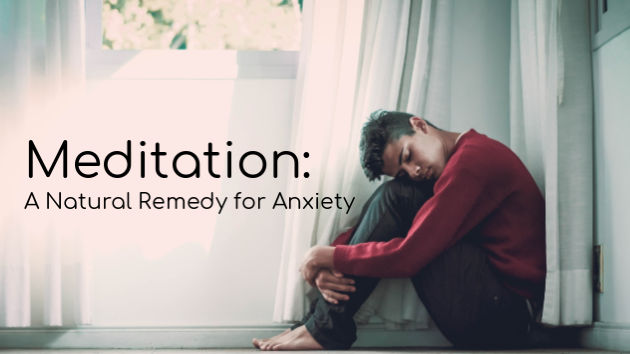
Statistics report that more than 40 million Americans suffer from anxiety and other forms of stress-related disorders. Sad, but true. In this fast-paced world, we live in, there is basically no time to sit down, relax, and catch one’s breath. Fortunately, meditation can assist in lessening this challenge.
There is always something to do, a goal to accomplish, a task to complete, an activity yet undone, and very basically little time to achieve all these. At the end of the day, you feel stressed out, and then the negative thoughts begin to set in.
“I didn’t do all of everything I was supposed to do today!” “I missed my deadline!” “How am I going to cover all of the bills this month?” “I think I might be coming down with something.” “What if I lose my job?”
That, right there, is anxiety. And if you kept on reading to this point, then I guess you’re familiar with that feeling of anxiousness. As one health blogger succinctly put it, you are one of the culprits running or spinning blindly through the non-stop “hamster wheel of anxiety.”
Common Anxiety Management Techniques
There are several popular ways to relieve anxiety–anti-anxiety pills and behavioral therapy being the most common of the lot. Have you been taking medications for your condition? Then it should come as no surprise to you that anti-anxiety pills are one of the most highly addictive substances on Earth.
You get so dependent on them, and this could inevitably create another problem of its own. Plus, once your body system gets used to these pills, their ability to relieve anxiety gradually reduces until it becomes virtually non-existent.
Behavioral therapy is a better option than pills for anxiety management. But let’s face it, treatment is expensive and time-consuming. If you don’t have the cash handy and don’t want to go the way of drugs, don’t worry about how to deal with your anxiety,. Instead, try going the natural route.
Benefits of Choosing Meditation
Ample research has proven that meditation helps people living with anxiety manage their feelings of nervousness and worry. In simple terms, meditation works. It is reputed to give the same calming effect as anti-anxiety pills.
What’s better? It’s natural, which means no unpleasant side effects. Instead, you get additional benefits asides being able to manage your anxiety.
More importantly, meditation is free. You don’t have to pay to meditate, and in cases where you want to purchase paid guided meditation courses online, the prices are meager.
How Does Meditation Help in Relieving Anxiety?
When you hear the word ‘meditation,’ yoga, out-of-body experiences, being on a different mental plane, and other related scenarios immediately spring to mind. While these are not wrong, they do not define the entirety of what meditation encompasses. Usually referred to as transcendental meditation, this form of meditation is prevalent thanks to its constant portrayal in movies, music videos, and commercials.
Other lesser-known types of meditation are beneficial and even more useful. And for anxiety management, research has shown that mindfulness meditation works best.
Focus on the NOW
In mindfulness meditation, rather than trying to take your mind out of what’s happening around you as is the case in most kinds of meditation, the goal is to keep you firmly entrenched in the present.
Why?
When you are anxious, you are either thinking of something that has happened in the past, or you are worried about something that might occur in the future.
You can control neither past nor future events, and mindfulness meditation helps you let go of such thoughts and focus on your present situation. More specifically, you focus on what is happening to you right now, your life at this moment. Not before or after. Just now.
Anxiety abates when you give no heed to what has happened or what is going to happen.
There is neither good nor bad
Mindfulness meditation also helps to relieve anxiety by switching off that part of your brain that sees something either as good or bad. As Shakespeare wrote in Hamlet, “Nothing is either good or bad, thinking makes it so.” It’s your thought process that classifies an event as good or bad, positive or negative, exciting or disappointing.
To deal with anxiety, you’ve got to quiet down that part of your brain. Mindfulness meditation teaches you not to judge. Simply assess any thought that comes as just that– an idea. Nothing more. Then push it away and focus on the present.
Stomp on the brakes
Anxiety sometimes develops when your brain won’t just stop thinking. Random thoughts cloud your mind, and you begin to analyze the pros and cons of each. You create scenarios and ponder the what-ifs of the situations you’ve imagined. The result? Unnecessary and unwarranted worries. And before you know it, you’re overloaded by stress and overly anxious.
When you meditate, you slow down your thought process and clear your mind. Your thoughts would then be able to flow in a logical and well-organized pattern. This way, you can relieve anxiety and achieve more effective results.
Switch off those negative thoughts
The brain is a fascinating, complex organ, but it is yours. You control it. Not the other way around. Meditation gives you much-needed control over certain parts of your brain.
The amygdala is the central fear system; this is where fearful, negative thoughts which result in anxiety emanate from. The amygdala is programmed to be very active. Health professionals say this is why you get more stimulated when you hear bad or negative news compared to good tidings. And the more you get stimulated, the more reactive and more prominent the amygdala becomes.
Meditation helps you break this cycle. Your amygdala begins to shrink in size with constant reflection, and over time, you would notice your response to negative news and fearful situations is at an all-time low.
Another area of the brain that meditation helps you conquer these emotions is the anterior cingulate cortex. This is the center of your thoughts and emotions. When you meditate, you activate or better still, command this part of your brain. Since you hold the key, once negative thoughts or feelings come in, you have the power to just turn them off.

A Simple Meditation Routine
You can try these simple steps at home, in the office, or wherever you find yourself. As long as you can get a quiet space for a couple of minutes, you can practice mindfulness meditation and get rid of anxiety.
- First, ensure you’re sitting upright, preferably on a chair, with the soles of your feet flat on the ground.
- Then take a couple of deep breaths. In and out.
- Now, close your eyes and breathe normally.
- Focus on your breathing. Not on anything happening around you or the noise in your mind, but on the fact that you are breathing. Oxygen is flowing into your nostrils.
- Naturally, your mind might wander, and thoughts might come to distract you, but never break concentration on your breathing pattern.
- A feeling comes in: “I just lost an important contract.” Don’t classify it as good or bad. Simply take it as a thought, then push it aside and focus on your breathing. Nothing else.
- Do this for at least 10 tp 12 minutes every day.
Crucial Take-Home Tips
Getting off that unproductive hamster wheel of anxiety is possible with meditation. However, remember these key points before you jump on the bandwagon.
- Meditation is not magic. You can’t start meditating today and expect your anxiety to vanish immediately. It doesn’t work like that. If you go in expecting that kind of result, you will end up extremely disappointed.
- You need to practice continually. As with anything worthwhile, you need to put in an effort. When planning your schedule for the day, create time for meditation. Yes, treat it like a compulsory event for the day. It can’t be an on-the-spur decision; you can’t decide to meditate on impulse. Mindfulness must be planned. Set time aside each day to stay quiet and meditate.
- Meditation requires discipline and commitment. You must have figured this out by now. In the whirlwind society we live in today, it can be tough to sit down and do nothing for minutes. But you need to discipline yourself to do it. Start with small periods. Consistently keep to it. Indeed, you will eventually discover one day that you’ve spent an hour sitting at one spot meditating and letting your anxiety drain away.
- Meditation doesn’t work for everyone. But there is no cause for alarm. If sitting in one spot makes your anxiety even worse, experts suggest you try other forms of meditation, especially moving mindful meditations. These involve moving and still focusing on the present like yoga, tai chi, mindful walking, just to mention a few.
So, next time, you feel those anxious thoughts coming on, look for a quiet place, and begin meditation.

